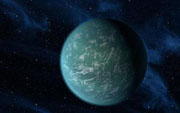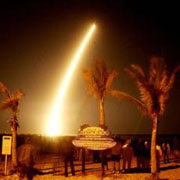VOA慢速英语2011--Study Confirms Earth-like Planet in What Scientists Call “The Habitable Zone”
时间:2018-12-01 作者:英语课 分类:2011年VOA慢速英语(十二)月
SCIENCE IN THE NEWS - Study Confirms Earth-like Planet in What Scientists Call “The Habitable Zone”
MARIO RITTER: This is SCIENCE IN THE NEWS, in VOA Special English. I’m Mario Ritter.
BARBARA KLEIN: And I’m Barbara Klein. Today, we tell about the discovery of a planet like Earth. We tell about a Canadian study of sea ice. And we attempt to answer a question involving computers.
(MUSIC)
MARIO RITTER: On a clear night, the sky is a wonderful thing. It seems we never grow tired of looking up and thinking. Is there life out there somewhere? Is there another place like Earth where life might exist? If so, where is it? And how far away is it?
Researchers with the American space agency think they know the answers to all those questions except the first. But without the Kepler spacecraft, they would still not know for sure. Last week, scientists announced the latest information from Kepler. The news is exciting!
BARBARA KLEIN: The Kepler spacecraft was named in honor of Johannes Kepler, the seventeenth century German astronomer 1. It was designed to examine a small part of the Milky 2 Way galaxy 3 and search for places like Earth.

This undated handout 4 artist rendering 5 provided by NASA shows Kepler-22b, a planet known to comfortably circle in the habitable zone of a sun-like star
Recently, the spacecraft found “22b”, a planet about six hundred light years away. The space agency says it is the first planet in a “habitable zone” outside our Solar System. That means the planet orbits a star like our sun, but it is not too close to it, nor too far away. Because of this position, scientists say, Kepler-22b might have water, one of the main things needed for life.
The newly-discovered planet is about two and a half times larger than the Earth. The planet is closer to its star than we are to the sun. But 22b’s sun is smaller than ours, and does not produce as much heat. Scientific instruments have yet to show what the new planet is made of. It could be gas, rocks, or some kind of liquid.
MARIO RITTER: The Kepler spacecraft was made to inspect over one hundred fifty thousand stars and measure how bright they are. It looks to see if a star’s brightness gets less over a short time.

Spectators watch the March, 2009 launch of NASA's planet-hunting spacecraft Kepler, from Cocoa Beach, Florida
If a planet passes between Kepler and the star, it blocks out part of the light. That is what suggested to scientists that there is at least one planet orbiting the star. The instruments on Kepler show the new planet as a small, black dot moving across its sun.
An important part of the Kepler experiment is on Earth. After the spacecraft gathers information, scientists use the large Spitzer Space Telescope, and smaller telescopes on the ground.
BARBARA KLEIN: Earlier this month, the American space agency reported that its scientists have discovered over one thousand new planets. Since Kepler was launched three years ago, they have found over two thousand three hundred. About two hundred of these are about the size of the Earth. Most are much larger. But it is the new planet’s distance from its star that is important. For life to possibly exist there, the planet’s temperature must not be too hot or too cold.
(MUSIC)
MARIO RITTER: Sometimes, the Earth changes quickly.
In two thousand five, Hurricane Katrina severely 6 damaged the city of New Orleans, Louisiana.
Last year, huge rainstorms caused landslides 7 near Rio de Janeiro, Brazil. People and buildings were washed away.
Thirty years ago, Mount St. Helens in the northwestern United States exploded. It was the most damaging volcanic 8 event in the country’s history.
But sometimes, when the earth changes, all you hear is … silence.
BARBARA KLEIN: You usually cannot hear sea ice melting in the Arctic Ocean, but change is taking place. And some scientists are concerned. They say our planet is getting warmer, and a great deal of ice is disappearing. Their experiments show that the ice has not melted this fast in the past one thousand four hundred fifty years.
The scientists examined sea ice records, tree rings, dirt from the bottom of lakes, and historical writings to estimate how much ice there once was. They found that sea ice has disappeared much more quickly just during the past thirty years!
MARIO RITTER: Christian 9 Zdanowicz of Natural Resources Canada reported results from the latest study last month in the journal “Nature.” He says that melting sea ice, way up north, is nothing new. But when he sees satellite pictures of the amount of ice that is melting, he thinks something important, and damaging, is happening.
Scientists believe that if this continues, there soon may not be any sea ice left during the Arctic summer. Christian Zdanowicz thinks the ice is melting much faster than before because people are burning oil and other fossil fuels.
BARBARA KLEIN: About eighty percent of all the sunlight that strikes the earth is reflected back into space. If there is less ice, that sunlight warms the ocean. Warmer ocean waters cause warmer air above the oceans. That can cause the whole planet to heat up. And that causes even more ice to melt. It becomes a destructive cycle.
Researchers with Natural Resources Canada say their work is far from done. They hope to answer three important questions. How unusual is this fast disappearance 10 of sea ice? Could this be something that happens only once? Or, is this part of a much longer phenomenon or event, something that has been going on for millions of years?
(MUSIC)
MARIO RITTER: Millions of us use them every day. Some are so large they have to sit on the floor. Others are so small that they fit in our hand. They help us with mathematical problems, store our music and pictures, and are needed to search the Internet. They are, of course, computers. So try this experiment. Ask a friend or just someone you see on the street this question: “Who invented the computer?”
BARBARA KLEIN: Some people cannot live without computers, but we know very little about who invented them. So who did it? Are you ready? The answer is … we do not know for sure. Many people who know a lot about information technology might say computers were invented by Alan Turing. He was a British mathematician 11 who helped solve coded messages from Germany during World War Two. Many people consider him the “father of computer science.”
But to find the first person who thought he could make a computing 12 device, we have to go back one hundred eighty years to a man named Charles Babbadge. He also was British.
Recently, researchers in his home country announced plans to use millions of dollars to build one of Babbadge’s “Analytical Engines.” John Graham-Cumming and Doron Swade are supervising the project at the Science Museum in London.
MARIO RITTER: It seems that Charles Babbadge never had time to build this machine. He left blueprints 13 or plans on what he thought would work. But the plans are not complete. That means the first thing the two Science Museum researchers have to do is find all the blueprints and decide how they fit together. Since this is a lot of work, they will publish the information on the Internet next year and ask people around the world to help them.
In Charles Babbadge’s day, there were no electrical power lines. So his computer would have been totally mechanical. His “Analytical Engine” was designed to be powered by steam. It was to have been made from brass 14 and iron. And it would have been very large, maybe even room size.
A number of cards with holes in them were to be used to tell the machine what to do. This kind of “programming” would have been similar to one that IBM – International Business Machines -- used in the nineteen sixties.
BARBARA KLEIN: Charles Babbadge died in eighteen seventy-one. As the years went by, his work was mostly forgotten. People who knew Alan Turing do not think that he knew much about what Babbadge had done. But Turing’s writings show that he was knowledgeable 15 about the work of Ada Lovelace. She lived during Babbadge’s time and knew about his machine. She even designed a way to make it work better.
Lovelace thought that this early computer should be able to do more than just add and take away numbers very fast. She thought it could be taught to make music, and to recognize images. Ada Lovelace left many notes about her work. When her writings were studied again years later, people began to call her the first computer programmer.
MARIO RITTER: The researchers in London hope to get suggestions from many people when they put the blueprints on the worldwide web next year. After that, they will attempt to build a complete Babbadge “Analytical Engine.”
They may be able to prove that this: (sound of keyboard typing)
once sounded like this: (sound of steam machinery).
(MUSIC)
BARBARA KLEIN: This SCIENCE IN THE NEWS was written by Jim Tedder 16. Our producer was June Simms. I’m Barbara Klein.
MARIO RITTER: And I’m Mario Ritter. Join us again next week for more science in Special English on the Voice of America.
- A new star attracted the notice of the astronomer.新发现的一颗星引起了那位天文学家的注意。
- He is reputed to have been a good astronomer.他以一个优秀的天文学者闻名于世。
- Alexander always has milky coffee at lunchtime.亚历山大总是在午餐时喝掺奶的咖啡。
- I like a hot milky drink at bedtime.我喜欢睡前喝杯热奶饮料。
- The earth is one of the planets in the Galaxy.地球是银河系中的星球之一。
- The company has a galaxy of talent.该公司拥有一批优秀的人才。
- I read the handout carefully.我仔细看了这份分发的资料。
- His job was distributing handout at the street-corner.他的工作是在街头发传单。
- She gave a splendid rendering of Beethoven's piano sonata.她精彩地演奏了贝多芬的钢琴奏鸣曲。
- His narrative is a super rendering of dialect speech and idiom.他的叙述是方言和土语最成功的运用。
- He was severely criticized and removed from his post.他受到了严厉的批评并且被撤了职。
- He is severely put down for his careless work.他因工作上的粗心大意而受到了严厉的批评。
- Landslides have cut off many villages in remote areas. 滑坡使边远地区的许多村庄与外界隔绝。
- The storm caused landslides and flooding in Savona. 风暴致使萨沃纳发生塌方和洪灾。
- There have been several volcanic eruptions this year.今年火山爆发了好几次。
- Volcanic activity has created thermal springs and boiling mud pools.火山活动产生了温泉和沸腾的泥浆池。
- They always addressed each other by their Christian name.他们总是以教名互相称呼。
- His mother is a sincere Christian.他母亲是个虔诚的基督教徒。
- He was hard put to it to explain her disappearance.他难以说明她为什么不见了。
- Her disappearance gave rise to the wildest rumours.她失踪一事引起了各种流言蜚语。
- The man with his back to the camera is a mathematician.背对着照相机的人是位数学家。
- The mathematician analyzed his figures again.这位数学家再次分析研究了他的这些数字。
- to work in computing 从事信息处理
- Back in the dark ages of computing, in about 1980, they started a software company. 早在计算机尚未普及的时代(约1980年),他们就创办了软件公司。
- Have the blueprints been worked out? 蓝图搞好了吗? 来自《现代汉英综合大词典》
- BluePrints description of a distributed component of the system design and best practice guidelines. BluePrints描述了一个分布式组件体系的最佳练习和设计指导方针。 来自互联网
- Many of the workers play in the factory's brass band.许多工人都在工厂铜管乐队中演奏。
- Brass is formed by the fusion of copper and zinc.黄铜是通过铜和锌的熔合而成的。
- He's quite knowledgeable about the theatre.他对戏剧很有心得。
- He made some knowledgeable remarks at the meeting.他在会上的发言颇有见地。